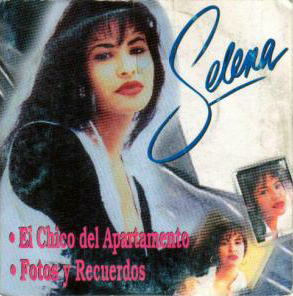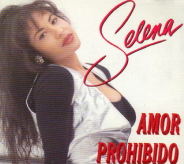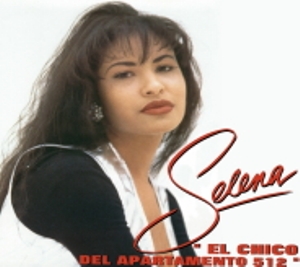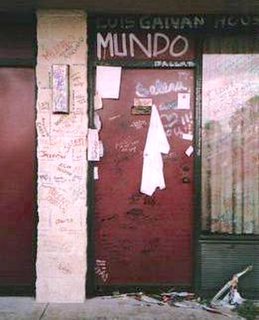Yolanda Saldívar is a former nurse and fan club president who was convicted of the murder of Tejano singer Selena Quintanilla-Pérez on March 31, 1995 in Corpus Christi, Texas. Saldívar will be eligible for parole on March 30, 2025.

Selena is a 1997 American biographical musical drama film written and directed by Gregory Nava about the life and career of Tejano music star Selena Quintanilla-Pérez, a recording artist well known in the Latino communities in the United States and Mexico before she was murdered by Yolanda Saldívar, the president of her fan club, at the age of 23.

Christopher Gilbert Pérez is an American guitarist, songwriter and author best known as lead guitarist for the Tejano band Selena y Los Dinos. He married the frontwoman of the group, Selena, on April 2, 1992. Pérez grew up in San Antonio, Texas as one of two children of Gilbert Pérez and Carmen Medina. In 1986, he joined Shelly Lares' band. By the late 1980s, Pérez was reputed among Tejano musicians for his guitar skills. This caught A.B. Quintanilla's attention; at the time, Quintanilla was seeking another guitarist for the band he produced, Selena y Los Dinos. Between one and two years after Pérez joined the band, he and Selena began a personal relationship.

Selena y Los Dinos was a Tejano band in which American singer Selena performed, until her murder on March 31, 1995. Selena fronted the band since 1981, started by her father Abraham Quintanilla. When Selena was signed with EMI Latin, EMI president José Behar told Selena that the world wanted Selena, not Los Dinos. Selena then began releasing her studio albums under her own logo title Selena and not Selena y Los Dinos. Before Selena was signed with EMI, the band had sold more than 80,000 copies in the state of Texas.

Amor Prohibido is the fourth studio album by American singer Selena, released on March 13, 1994, by EMI Latin. Having reached a core fan base, the label aimed to broaden her appeal with the next studio release. Finding it challenging to write a follow-up hit after "Como la Flor" (1992), Selena's brother A. B. Quintanilla enlisted the assistance from band members Ricky Vela and Pete Astudillo with writing the album's songs. The resulting album has a more mature sound featuring experimental production that blends diverse musical styles from ranchera to hip-hop music. Amor Prohibido is a Tejano cumbia album modernized with a synthesizer-rich delivery using a minimalist style that was quintessential in early 1990s Tejano music.

Selena is the self-titled debut studio album by American Tejano singer Selena, released on October 17, 1989 by EMI Latin. Its music incorporates a range of contemporary genres with a mix of cumbia and regional styles of Mexican music. The album was released following company president Jose Behar's failed crossover request for the singer. The project was denied by the heads of EMI Records' pop division, believing the singer should first strengthen her fanbase. Selena's brother and principal record producer and songwriter, A.B. Quintanilla fought to remain the singer's producer. The band introduced Pete Astudillo and Joe Ojeda, who contributed to the album's experimental production and songwriting. Aside from A.B., Selena worked with two Mexican songwriters, Alejandro Montealegre and Reinaldo Ornelas.

Live! or Selena Live! is a live album by American Tejano pop singer Selena, which was released on May 4, 1993 by EMI Latin. The album was re-released on September 22, 2002 as being part of the Selena: 20 Years of Music collection; which included spoken liner notes by her family, friends and her former band members Selena y Los Dinos. Live! includes three cumbia-influenced studio tracks, while the rest of the album consists of live versions of previously released songs. The album was recorded during a free concert at the Memorial Coliseum in Corpus Christi, Texas, on February 7, 1993. It was certified gold by the Recording Industry Association of America in its first year, double platinum in 1995, and gold (standard) in 2002.

Ones is a compilation album by American singer Selena, released in the United States on October 1, 2002 by EMI Latin. It was released on November 11, 2002 in Spanish-speaking countries, while the limited edition included a bonus DVD of her music videos. Ones was released building on the popularity of the 1997 biographical film Selena. The album was aimed at Selena's new generation of fans, and its released marked the singer's twentieth year in the music industry. Ones features six number one singles namely, "Amor Prohibido", "Bidi Bidi Bom Bom", "No Me Queda Más", "Fotos y Recuerdos", and her duets with Álvaro Torres on "Buenos Amigos" and the Barrio Boyzz on "Donde Quiera Que Estés".

"Fotos y Recuerdos" is a song recorded by American recording artist Selena for her fourth studio album, Amor Prohibido (1994). It was released by EMI Latin in January 1995, as the fourth single. A cover version of the Pretenders' 1983 single "Back on the Chain Gang", "Fotos y Recuerdos" was written by Chrissie Hynde with Spanish-language lyrics by Ricky Vela. Lyrically, the song describes a lonely female protagonist who "kisses the photo of her [lover] each night before falling asleep."

"Techno Cumbia" is a song recorded by American singer Selena for her fourth studio album, Amor Prohibido (1994). It was posthumously released as the b-side track to "Dreaming of You" through EMI Latin on August 14, 1995. "Techno Cumbia" was written by Pete Astudillo and co-written and produced by Selena's brother-producer A.B. Quintanilla. The song is a techno-pop cumbia recording with influences of dancehall, rap, Latin dance, and club music. Lyrically, Selena calls on people to dance her new style the "techno cumbia" and calls out those who can't dance.

"Amor Prohibido" is the title song of American Tejano singer Selena's fourth studio album of the same name (1994). Released as the lead single through EMI Latin on April 13, 1994, it was written by Selena, her brother and music producer A.B. Quintanilla, and her band's backup vocalist Pete Astudillo. Selena wanted to write and record a song about her grandparents–who fell in love despite their different social classes. "Amor Prohibido's" lyrical themes have been analyzed by authors, musicologists, and journalists, who found them relevant to issues facing the LGBT community. A popular interpretation compares it to Romeo and Juliet.

"Si Una Vez" is a song recorded by Mexican-American recording artist Selena for her fourth studio album, Amor Prohibido (1994). It was written by Pete Astudillo and produced by Selena's brother-producer A.B. Quintanilla. "Si Una Vez" is a mariachi fusion song and draws influence from cumbia and Latin dance music. Lyrically, Selena questions why she ever fell in love with an abusive partner, saying she will never repeat her mistakes. The lyrics suggest unrequited love and female empowerment.

"El Chico del Apartamento 512" is a song recorded by American recording artist Selena for her fourth studio album, Amor Prohibido (1994). It was released along with "Fotos y Recuerdos" in January 1995, serving as its b-side track. Written by Ricky Vela, "El Chico del Apartamento 512" is a cumbia song with influences of Colombian and South American music. Lyrically, the song describes a female protagonist who knocks on her love interest's apartment door and is heartbroken when his sister answers it. Justino Aguilar of Billboard magazine, called "El Chico del Apartamento 512" as one of Selena's "most memorable songs". The track posthumously peaked at number one on the U.S. Billboard Regional Mexican Digital Songs chart in 2011.

La Leyenda is the name of the third box set from the Tejano pop singer Selena that was released by Capitol Latin/EMI and Q-Productions labels. The album was released on March 9, 2010. This box set was released in three formats: a four-disc box set, a two-disc special-edition album, and a single-disc album. According to Suzette Quintanilla's YouTube video, EMI teamed up with Q-Productions to release this box set, and Quintanilla asks Selena fans around the world to contribute a special message to Selena that may or may not be included in the new box set. The Box-sets will contain an exclusive "Selena" charm and four booklets that include messages from Selena's family, friends, and fans from around the world. Selena fans around the world were told to collaborate pictures of themselves to be part of the La Leyenda bound books, but in early February 2010, Q-Productions and Capitol Latin decided to cancel the transaction due to legal actions with copyrighted images from fans.

Selena Quintanilla-Pérez was an American singer who achieved international fame as a member of Selena y Los Dinos and for her subsequent solo career in both Spanish and English. Her father and manager, Abraham Quintanilla, appointed Yolanda Saldívar president of Selena's fan club in 1991 after Saldívar had repeatedly asked permission to start one. In January 1994, Saldívar was promoted to manager of the singer's boutiques. Selena's employees, fashion designer, and cousin began complaining about Saldívar's management style. In January 1995, Quintanilla Jr. began receiving telephone calls and letters from angry fans who had sent membership payments and had received nothing in return. He began investigating their complaints and found evidence that Saldívar had embezzled $60,000 from the fan club and the boutiques using forged checks. After the Quintanilla family confronted her, Saldívar bought a gun, lured Selena to a motel room, and shot her in the back. Although doctors tried to revive Selena, she was pronounced dead from loss of blood and cardiac arrest.
"Missing My Baby" is a song released by American singer Selena on her third studio album Entre a Mi Mundo (1992). It was composed by A.B. Quintanilla—her brother and principal record producer, whose intention was to showcase Selena's diverse musical abilities. Selena included it on the album to help her cross over into the English-speaking market. Critics praised her emotive enunciation in the song. After Selena was murdered in 1995, a posthumous music video made for VH1 was released to promote the triple box-set Anthology (1998).

Enamorada de Ti is the second remix album by American Tejano singer Selena. It was released posthumously on 3 April 2012 through Capitol Latin and Q-Productions. Enamorada de Ti was produced by Sergio Lopes, Leslie Ahrens, Andres Castro, Moggie Canazio, Cesar Lemons and Chilean record producer Humberto Gatica. Gatica had the idea of modernizing songs recorded by Selena into today's popular music genres. Selena's family had already been working on a similar idea, but they set it aside in favor of Enamorada de Ti, which had gained the approval of Capitol Latin. The selection of artists to sing duets with Selena began in late summer 2011. Gatica and Selena's family chose American singer and actress Selena Gomez, Puerto Rican singer Don Omar, Samuel "Samo" Parra from the Mexican rock band Camila, Mexican singer Cristian Castro, Spanish DJ mixer Juan Magan, and the Carlos Santana band, while the remaining songs selected were remixed.















